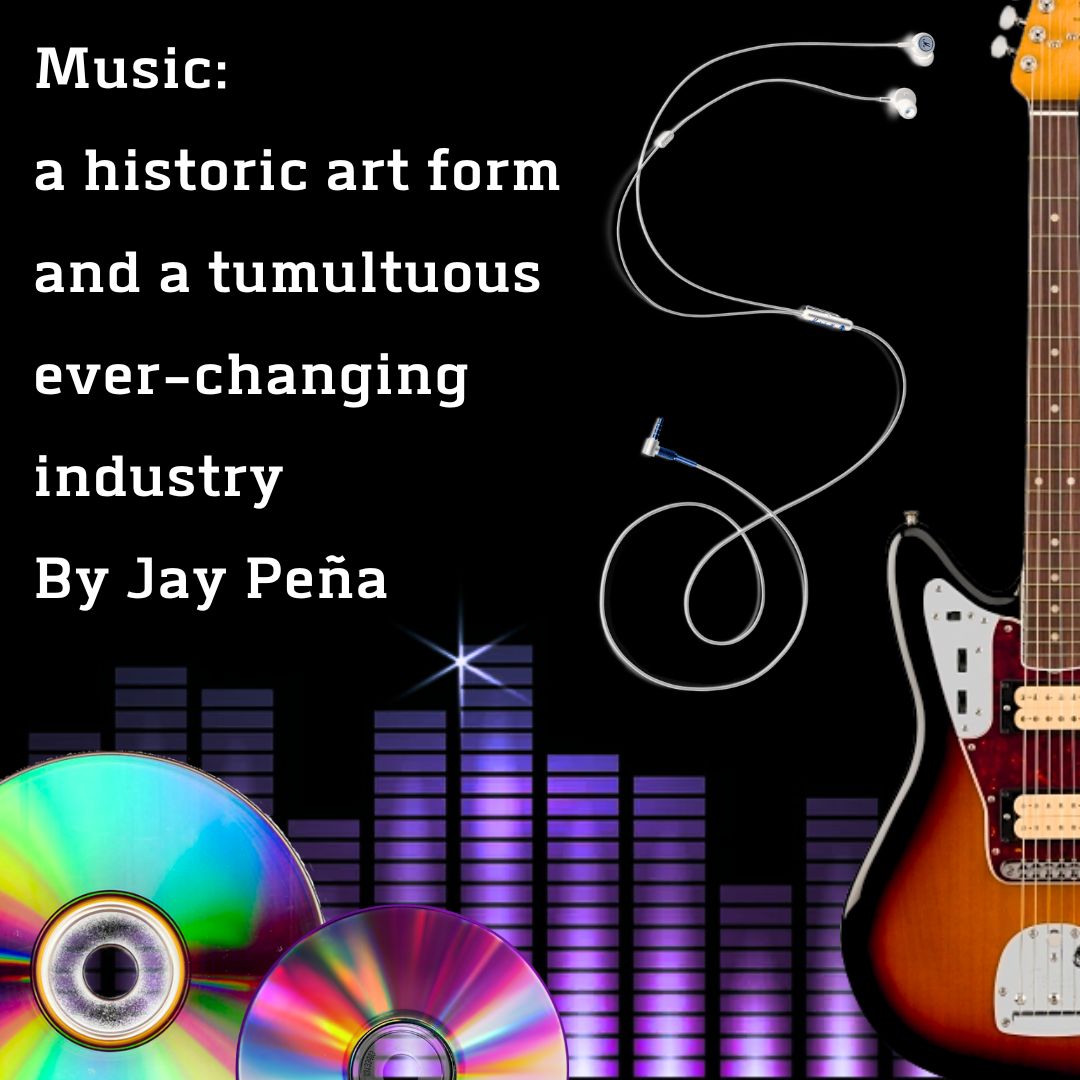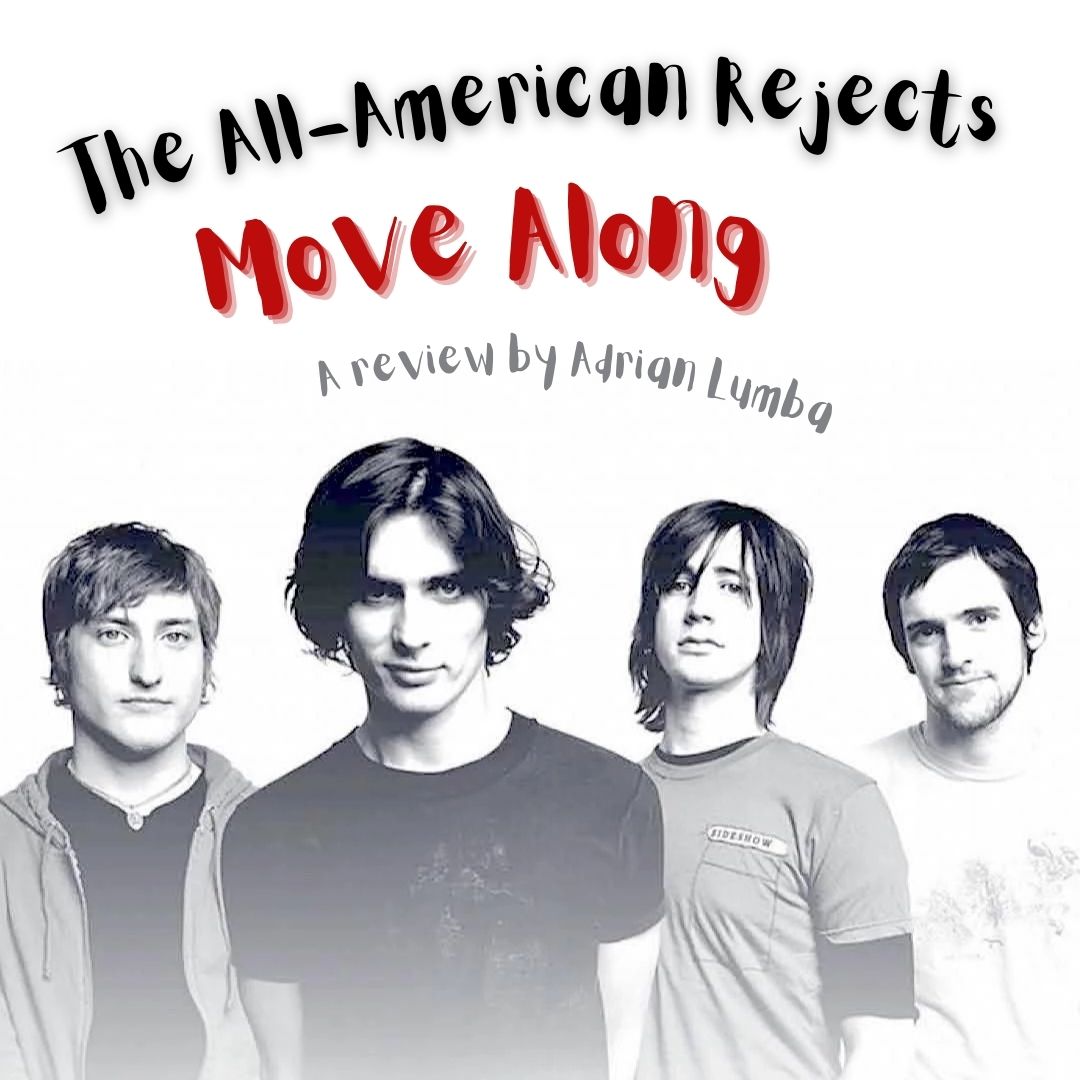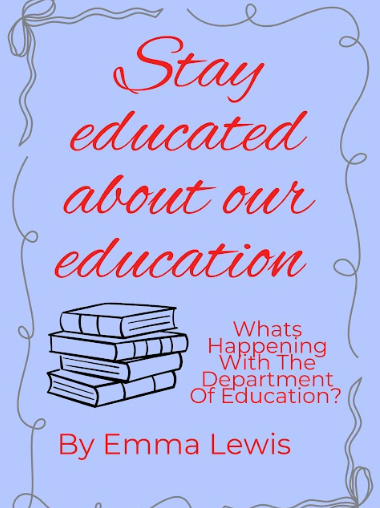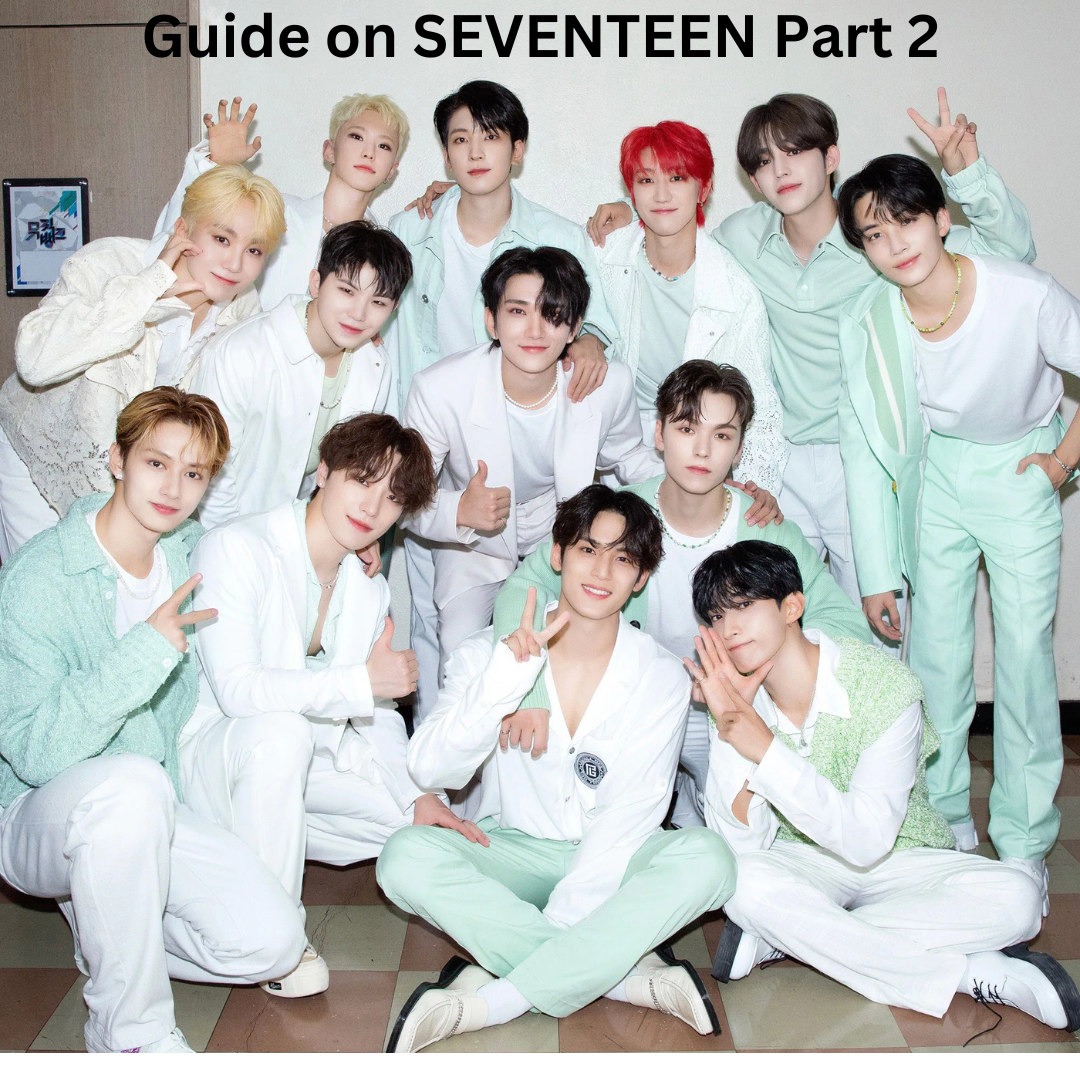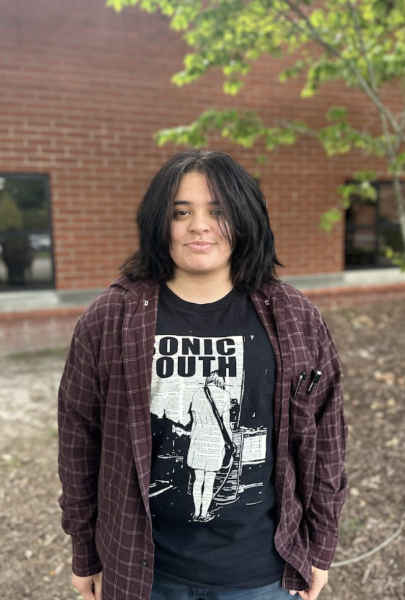Music has long been an integral part of human artistic expression and communication. Despite the constant changes the medium experiences, from how it is listened to, to how it is created and performed, the role music plays in people’s lives remains significant. Whether or not all the changes music has experienced have been positive is widely debated, but music in and of itself is still widely enjoyed and loved.
“Music is one of the only things that has consistently helped me in my daily life, particularly concerning my mental state,” said sophomore Li Reyes.
While the role music plays in people’s lives hasn’t changed too much, the means and methods we use to create music and listen to it have greatly altered. Today, music streaming is the main way people listen to and access music. In fact, according to the California Learning Resource Network, as of 2023, about 713 million people had a subscription to a music streaming service globally. With this change in how people consume music, people’s listening behavior has also changed. Today, the average person listens to about 14 hours and 24 minutes worth of music per week compared to the average of six hours and 15 minutes in 2000. This shift to digital music streaming from physical music media can also be seen in students’ listening patterns.
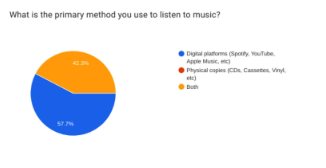
“I listen to [music] a lot,” said junior Emma Miller. “I have an average of eleven hours on my screen time, and, like, 90% of that is just music. I just use YouTube, and I make playlists with all my favorite songs.”
Platforms like YouTube, Spotify, and Apple Music have greatly transformed how we listen to our music. With various features making the process of finding and listening to music more accessible and fun, it’s no surprise that these platforms have made waves in popularity, with streaming making up 85% of music sales in 2024.
“I like the fun these platforms infuse into the process of listening to music,” said Reyes. “Such as platform-exclusives, high-quality music videos, no ads, playlist making with customization, and overviews of your listening habits that include suggestions on new music (i.e. Spotify Wrapped).”
While digital streaming platforms have become the preferred method of accessing music for listeners, the same can’t be said for artists who release music on these platforms. There has been recent pushback from musicians regarding how artists on these platforms are paid. According to PBS.org, as of 2020, Spotify paid roughly .003 cents per stream of a song. However, it is undeniable that streaming and digital music platforms are here to stay. This shift to more digital listening and music discovery is also reflected in the popularity of music content on social media.
“I wanna say [the internet and social media have been] positive [for music],” said Miller. “Music has become more accessible, and it’s easier for smaller artists to get their name out there.”
Miller is not alone in this sentiment; the internet and social media have become popular means of music discovery and have made music significantly more accessible to the masses.
“The internet has done so much for the medium of music,” said Reyes. “The internet, especially social media platforms, have allowed new musicians and old alike to find new audiences in record time. Additionally, the internet has allowed people to study music with an ease of access never before seen; from online sheet music to music theory videos on YouTube, there is a wide plethora of resources one can use to learn and improve their music skills.”
However, despite the great benefits the internet and social media offer musicians, not all the effects of this shift have been positive. As with anything, there are negative aspects that come with the positive ones.
“There is only one negative I can truly imagine, which is the homogenization of music,” said Reyes. “While always an omnipresent and persistent issue, the internet has given music companies and musicians a large database on what sells the most, and, as such, certain artists and songs seem to be built off formulas rather than genuine passion.”
The concern regarding the lack of passion in music in favor of formulas has become a greater issue in modern times, especially with the advent of generative AI and AI created music. Now, with seemingly the press of a few buttons, an entire song can be written and even performed in some instances. Of course, the creation of these songs doesn’t come without criticism. The originality and artistic merit of AI created works are often brought into question.
“I like songs that are original and from the heart. [The artists] sit there and think about what they’re going to write,” said junior Lindsey Haske. “With AI music, it’s like cheating on an essay with ChatGPT. It’s like me sitting here and opening up ChatGPT and just typing out ‘come up with song lyrics.’ It’s just going to copy songs from all over; it’s not original.”
Despite these criticisms, AI is still used in various contexts within the music industry. The famous 80’s synth-pop group Tears for Fears found themselves in hot water last year after users on social media discovered that their 2024 album, Songs for a Nervous Planet, had an AI generated album cover. This accumulated mass criticism within the music sphere resulting in the band defending their actions, publicly stating that AI is “just one of the many tools in the creative process.”
This has not been the only recent instance of an attempted integration of AI into music. Various songs and music projects have been created with the use of AI; some have even been created with the intent to mimic the voices and sounds of real living artists. Naturally, the ethics of AI created music have been heavily debated. In fact, some major label artists such as REM, Billie Eilish, and Stevie Wonder have advocated against the use of AI in music.
“AI needs to be trained on other people’s work; the AI just pulls from anyone,” said Miller. “It’s literally just stealing. Yeah, you can add some new elements, but at the end of the day, you stole someone’s work. It would be fine if they got artists to train AI with new work, but they’re not; they’re just stealing artists’ work and exploiting smaller artists. I just hate generative AI when it’s being used to create soulless music to exploit the industry. ”
Miller brings up an interesting point regarding AI created art. AI, specifically generative AI, must be trained on previously existing works, meaning that artist’s work is often used to train these programmes with or, often times, without their consent, making the use of AI art a fairly large ethical quandry within the music industry with accusations of plagiarism and copyright infringement surfacing.
“I personally find AI music to be quite bothersome. The utilization of AI in art fields such as music has a number of bad impacts,” said Reyes. “First, a lot of AI are trained off of real music artists who typically don’t give their consent to have their art used in such a manner. Secondly, by creating a cheap platform where ‘art’ can be ‘made’ at half the cost of genuine art made by humans, there is a real threat of AI taking jobs from creatives. The argument is often given that these AI programs just aren’t good enough for this to be true, or that people will always choose human art over AI — but this isn’t true. AI programs are ‘improving’ day by day at a rapid rate, with billions of dollars being invested into such machines by many institutions and even countries. In addition, we’ve already seen the use of AI by many mass-conglomerate companies that care more about profit than their consumers and workers. AI is making its way into every aspect of our lives, and it will only continue to do so.”
Reyes offers an intriguing perspective on the role that companies have played in the rise of generative AI. With multiple AI music and art generation start-up companies coming out of the woodworks and massive music giants such as the aforementioned streaming service Spotify investing into various AI tools, it makes one wonder how the position musicians have in the world will change in the future with the rapid growth and expansion of AI in the music industry as well as how music itself will change.
“By looking at music as a formula, it destroys the humanity inherent in its creation,” said Reyes. “Many have already criticized non-AI music that’s clearly formulaic; imagine a world where it’s literally a formula!”
While AI has been shown to pose a potential threat to music and artists’ livelihoods, there has been just as much debate and discussion regarding generative AI’s impact on the environment as well. According to MIT, AI is a very demanding technology that requires great amounts of electricity and water to work efficiently, posing dangerous consequences for the environment.
“[Generative AI] is so harmful to the environment; the computer systems are so unoptimized,” said Miller. “They take up so much water to cool them. There are companies trying to make these systems less demanding, but they aren’t that popular.”
With the many changes occurring within the music industry and the huge implications these changes present, some have expressed their concerns for the future of artists working in the field of music.
“It will probably get worse for artists in the future,” said Haske. “I think a lot of musicians are going to lose their jobs, and AI will replace jobs that were held by artists before.”
Reyes shares this concern.
“It is my hope that AI will be properly integrated into art fields,” said Reyes. “Certain features may be commendable, but the outright use of AI ‘creations’ without changes or human voice is disgusting. I want my robots to clean my house, so I can make art; I don’t want to clean my house, so my robots can make art!”
Other students, however, are more hopeful about the future of music and the lives of artists, suggesting that music creation and music itself will improve.
“I think being a musician will get better,” said Miller. “There are a lot of musicians speaking out about the exploitation, like Chappell Roan’s speech at the Grammys; I thought that was great. Though it really only matters if [the artist has] some authority. Like, small artists have been talking about this for years. Going back to the internet, I’ve seen a trend of smaller artists getting more popular, and I think that’s great. I don’t think AI will become too big of a problem, hopefully not. Music is so inherently political, and people hate AI. I think AI in the art community just won’t be able to flourish.”
There is one thing in life that never changes, and that is the fact that everything in life is subject to change. Music, as we know it, has experienced massive changes and will continue to do so. The real question is this: Will these changes be for the better or for worse? Only time will tell.
